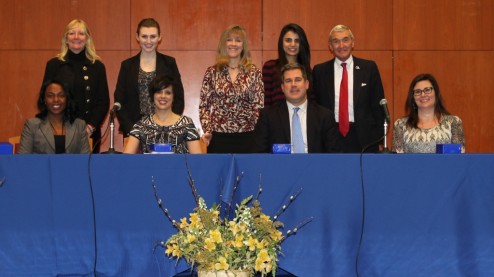Women’s Leadership Program Hosts “Who Owns the Room” Panel Discussion
Written by: Melissa Vega
On February 23rd the Women’s Leadership Program hosted its third annual panel discussion. The theme was “Who Owns the Room”, an insightful discussion on navigating a highly successful career. The discussion was moderated by Kathleen Ellis, Senior Vice President of Chubb Multinational Solutions.

Left to right: Moderator Kathleen Ellis, Women’s Leadership Program Co-President Kathleen Yeckley, Dean Joyce Strawser, Women’s Leadership Program Co-President Sumera Munhaf, Director of the Gerald P. Buccino ’63 Center for Leadership Development Mike Reuter, Panelist Lissa Farrell, Panelist Diane Nugent, Panelist Ken Warman and Panelist Joan Bosisio
A few highlights of the evening were captured below.
Panelists:
Joan Bosisio, Vice President of Stern Strategy Group
Ken Warman, Chief of Staff of Prudential
Diane Nugent, Recruiting Manager of Adison & Partners
Lisa Farrell, LJF Consulting
Discussion:
Q: What does owning the room mean to you?

Panelist Ken Warman addresses what it means to own the room.
Ken – Owning the room to me means understanding what the room wants from you, as well as understanding your audience. When asked a question from someone in your audience you need to be able to deliver by answering the question clearly and figuring out how to drive consensus.
Joan – Sometimes owning the room means being able to take a step back. You have to recognize that you will not always have the answers to all the questions. You may have to ask questions as well. You have to figure out what are the strategic questions to ask in order to be portrayed as a collaborative person. Use power questions in order to establish your questions.
Lisa – Owning the room is about entering the room with a mindset of what you can contribute. You have to identify what can you can obtain or observe, and you have to offer in order to absorb and provide benefits.
Diane – Owning the room is about taking the time to show up fully present in a confident way that involves bringing your best self.
Q: How do you appear confident without appearing cocky?
Joan – Body language is extremely important. You have to be poised. Demonstrate you are confident by asking insightful questions. You have to understand that you don’t know what you don’t know, and be able to admit this.
Ken – Always know you’ll lose a few games. You will not win them all. Be humble. Bring your best self. Be confident with your gifts and strengths, but do so in a way that is humble and genuine. Be engaging, so people want to be around you. No one wants the cocky person on the project team, because they are the ones constantly telling you what to do. Don’t be this person. Instead be a humble confidence that tries to help others solve the problem. Listen to problems and do not interject.
Q: What are the “Do not do” methods for owning the room?
Lisa – Do not treat people differently. Everyone has their own skill. Your internal knowledge is unique. Treat the Vice President and mailroom attendant equally. Everyone is interchangeable. Be authentic. Your authentic self is your confident self.

Panelist Lissa Farrell offers her input to the crowd of executives, students and faculty.
Q: What does networking mean to you?
Lisa – Networking is ensuring that you are not only known by a diverse category of people, but you in fact know a diverse category of people. You need to be able to enter a room and introduce yourself to anyone who is present.
Diane – Networking is about not being afraid to ask the questions. Don’t be afraid to think outside of the box. Use every opportunity to network.
Ken – Networking means extend your network outwards. You don’t need to have all the answers in networking. Give answers and ask questions back. Force yourself to engage.
Joan – Start networking now in college. Join groups on campus, join professional associations, surround yourself with professionals, and ultimately be exposed.
Q: Where do you draw the line in being too open when developing relationships?
Lisa – Draw a line between personal and professional. You can hire friends if they are the appropriate fit, but manage your expectations and professional and ethical conduct.
Q: Do you think it is better to have a broad set of experiences or one sector of specialty?
Joan – It depends on your industry. However, you should be able to be a deep generalist with an array of experiences.
Q: What final pieces of advice would you like to share?
Ken- Trust your instinct. Always have an internal board of directors that you trust. Believe in yourself. Be humble confidence.
Diane – Contribute to your internal compass. Do what drives you. Authentically bring your best self and success will come to you. Know what you want. Determine how you define success. Don’t be afraid to reassess.
Joan – Do what you love and the money will follow. Remember, you don’t know what you don’t know. If you want the apple, you have to shake the tree.
Thank you to all panelists for creating a memorable night!
- Three Minute Leadership – On Resilience… a Key in Decision-Making
- Leadership Students Attend Rider University Leadership Symposium